A bench multimeter is a highly versatile and common electronic test instrument used to measure various electrical parameters such as voltage, current, resistance, capacitance, and frequency in an electric circuit. Unlike handheld multimeters, which are relatively more compact, bench multimeters are larger devices designed for stationary use over a workbench or laboratory table, making them suitable for more controlled and precise measurement applications. Choosing an ideal bench multimeter is extremely important, especially if you buy one for professional application. If so, you check the following parameters before you make the choice.
- Resolution: Resolution is a critical specification for a bench multimeter because it directly affects the instrument’s ability to provide precise and detailed measurement readings. This parameter refers to the smallest increment or step by which a multimeter can display or measure a quantity. Simply put, it represents the level of detail or granularity in the measurement results.
- Voltage Measurement Range: The voltage measurement range defines the upper and lower limits of voltage that the multimeter can accurately measure. Understanding the significance of voltage measurement range is essential for ensuring safe and precise electrical measurements in various applications. Using a bench multimeter which does not offer the voltage range for a particular task can lead to hazards, including instrument damage and even personal injuries.
- Current Measurement Range: One of the primary reasons the current measurement range is important is safety. Current levels in electrical circuits can vary widely from microamps (μA) in delicate electronic components to amperes (A) when it comes to high power systems. Therefore, you should carefully check the current measurement range of the multi-meter to see if the instrument you are picking up is suitable for the application or not. It also states its importance regarding the safety and reliability of the instrument in different scenarios.
Choosing the perfect bench multi-meter ensures the accuracy and reliability of measurements. And since bench multimeters are often used in research, development, and quality control environments, you would want a bench multi-meter that offers precise results for all measurements. For that, we suggest going with one of the best options we have gathered here for our list of the best multi meter. We also have a “Buying Guide” for the best bench multimeter where you can study the most important aspects of a bench multimeter and check how you can pick up the perfect option for your requirements.
Outline
ToggleBest Bench Multi Meter List
| Best Bench Multimeter | Resolution | Voltage Measurement Range | Current Measurement Range | Buy Now |
|---|---|---|---|---|
| Siglent Bench Multi Meter | 4½ Digit | DC - 600 mV-1000 V AC - 600 mV -750 V | 600µA -10 A | Check On Amazon |
| Siglent SDM3055 Bench Multi Meter | 5½ Digit | DC - 200 mV - 1000 V AC - 200 mV -750 V | 200µA -10 A | Check On Amazon |
| Tenma Bench Multi Meter | 3½ Digit | DC - 200 mV - 1000 V AC - 200 mV -750 V | 200µA -10 A | Check On Amazon |
| Abestop Bench Multi Meter | 55,000 counts | AC - 50 mV -1000V DC - 500 mV - 750V | 500µA -10A | Check On Amazon |
| OWON Bench Multi Meter | 55,000 counts | AC - 50 mV - 1000V DC - 500mV - 750V | 500µA -10A | Check On Amazon |
| Rigol Bench Multi Meter | 5½ Digit | DC- 200 mV - 1000V AC - 200 mV -750 V | 200µA -10 A | Check On Amazon |
Best Bench Multi Meter Reviews
1. Siglent Bench Multi Meter
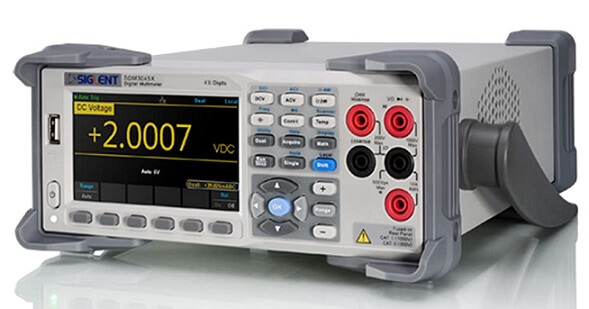
In the 1st place, we have the Siglent Technologies SDM3045X Digital Multimeter, a precision instrument offering high accuracy and versatility in electrical measurements. With many positive feedback from its users, this multi meter caters to the needs of professionals and enthusiasts alike. The SDM3045X boasts a dual display, allowing you to monitor multiple measurement parameters simultaneously, enhancing your efficiency and convenience. Plus, the true RMS capabilities, this multimeter ensures accurate measurements of both AC and DC signals, ensuring you obtain reliable data for your electrical tests.
Delivering an impressive basic DC accuracy of 0.1 per cent, the SDM3045X offers the precision required for even the most demanding tasks, from electronics testing to quality control. This multimeter offers various measurement functions, including DC voltage and current, AC voltage and current, 2/4-wire resistance, capacitance, continuity, diode testing, and temperature measurement. The TC temperature measurements are also supported with built-in cold junction compensation.
Best Features
- This is a 4½ digit resolution bench multi meter
- 600 mV – 1000 V DC voltage measurement range
- 600 mV -750 V AC voltage measurement range
- The current measurement range is 600 µA -10 A
Pros
- This is a premium and reliable choice for a bench multimeter
- Many different types of measurements are supported
- Multiple connectivity options are provided
Cons
- Too expensive for personal use for DIY projects
2. Siglent SDM3055 Bench Multi Meter
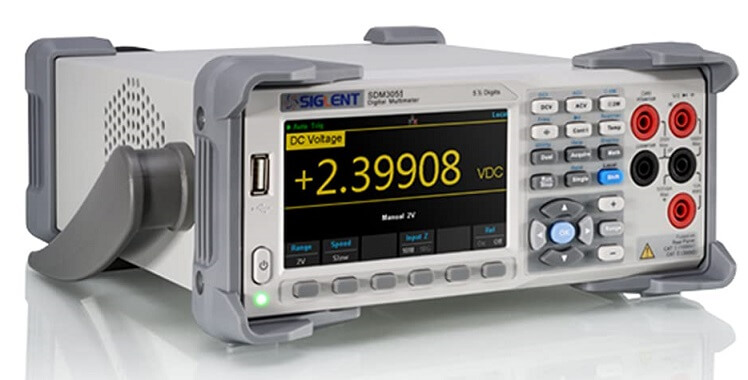
In the 2nd position, we have the Siglent Technologies SDM3055, a powerful and precise instrument designed to meet the highest standards in electrical measurement. This multi meter certainly stands out with its exceptional precision and a 5.5 digit display. This ensures accurate readings across a wide range of measurement parameters. And just like the last option, it also features a dual display allowing you to monitor multiple results simultaneously, providing real-time insights for your tests and experiments.
The SDM3055 also offers a strong set of measurement functions, including DC voltage and current, AC voltage and current, wire resistance, capacitance, continuity, diode testing, and many others. And with the USB host, USB device, and LAN interfaces, this multimeter simplifies data transfer and integration with your computer or network. This facilitates efficient data analysis, documentation, and remote control. You will be glad to know that The SDM3055 can deliver up to 150 readings per second, which can help you reach the peak productivity for any experiment.
Best Features
- This is a 5½ digit resolution bench multi meter
- 200 mV – 1000 V DC voltage measurement range
- 200 mV -750 V AC voltage measurement range
- The current measurement range is 200 µA -10 A
Pros
- Most premium choice for a bench multi meter
- It has a USB Host and a LAN port
- Fast results are provided
Cons
- Most expensive choice for a digital bench multi meter
3. Tenma Bench Multi Meter
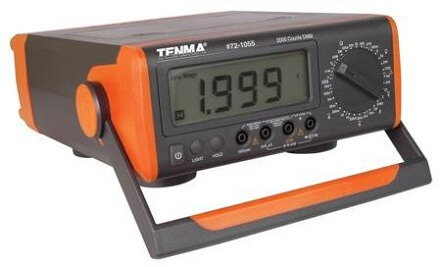
The 3rd place on our list of the best bench multi meter is for the Tenma 72-1055 Benchtop Digital Multimeter. This is one of the most affordable choices available right now for a bench multi meter which still offers a wide range of features and functionality. As for measurement, this multi meter supports AC/DC voltage, AC/DC current, resistance, frequency, temperature, and capacitance. In addition to basic measurements, this multimeter also features diode testing and a continuity buzzer, allowing you to check the integrity of components and circuits quickly. It even supports transistor testing, enhancing its versatility.
Here, you have the flexibility to manually select measurement functions or take advantage of the auto-ranging feature, which automatically adjusts the measurement range to ensure accurate readings. The data hold function allows you to freeze measurement readings on the display, making it convenient to record and analyze data without the need for constant monitoring. With an input impedance of around 10 Mohm for DC voltage, this multimeter ensures minimal loading of the circuit under test, preventing interference and ensuring precise measurements.
Best Features
- This is a 3½ digit resolution bench multi meter
- 200 mV – 1000 V DC voltage measurement range
- 200 mV -750 V AC voltage measurement range
- The current measurement range is 200 µA -10 A
Pros
- One of the most affordable choices for a multi meter
- Additional features are available such as LCD backlight
- High safety rating
Cons
- Some importance features are missing which might be crucial for professional needs
4. Abestop Bench Multi Meter
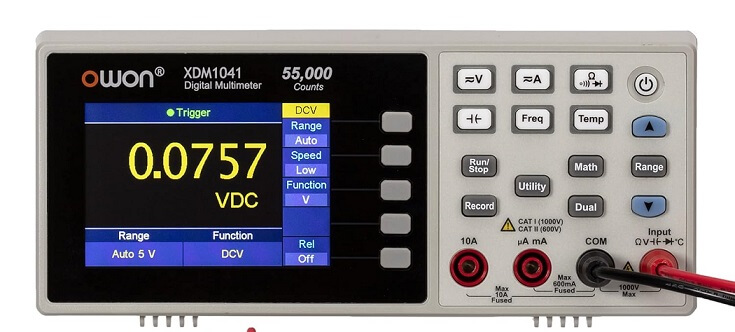
The XDM1041 is designed with portability in mind. Its ultra-thin body and lightweight construction make it easy to carry and store, perfect for professionals on the go. The 3.5-inch high-resolution LCD digital display screen ensures clear and easy-to-read measurement data, enhancing your measurement experience. The user-friendly interface simplifies data access, storage, and management, displaying results in a tabular form. It is a highly versatile tool, capable of true RMS AC voltage and current measurements.
It also features a data record function that lets you save measured data internally for later retrieval and processing on your computer. The multimeter also supports trend analysis in chart mode and SCPI for additional functionality. It also has an impressive DC voltage accuracy of up to 0.05% and can achieve up to 65 readings per second for faster calculations. You will also get a 1-year quality assurance warranty on this digital multi meter, ensuring peace of mind in your investment.
Best Features
- It has a 55000 counts display
- 50 mV – 1000 V DC voltage measurement range
- 500 mV -750 V AC voltage measurement range
- The current measurement range is 600 µA -10 A
Pros
- Most affordable choice for a bench multi meter
- Best option for personal use
- Display size is pretty good
Cons
- Display resolution could have been better
5. OWON Bench Multi Meter
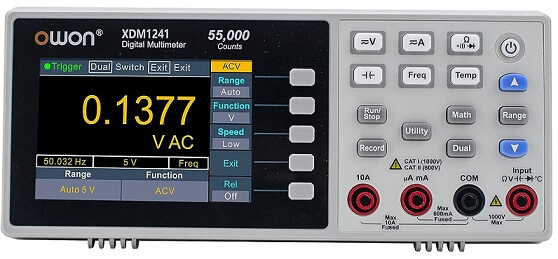
The OWON XDM1241 is yet another budget option on our list that features a 3.5 inches 480 x 320 resolution TFT LCD screen with a backlight, providing high clarity and precision with 55,000 counts. This display ensures that measurement data is presented in a clear and easily readable format, even in varying lighting conditions.Apart from standard AC/DC current and voltage measurements, it also supports additional features such as resistance, capacitance, diode testing, etc. Such a comprehensive toolset for various measurements makes it a necessary instrument for laboratories.
The multimeter also allows for manual or auto recording of measured data into its internal memory. The data is conveniently displayed in a tabular format. Furthermore, it supports SCPI which enables remote control of the multimeter via PC through the USB port. This feature enhances the efficiency of data collection and analysis. As for the build quality, this multi meter is made up of high-quality ABS material with an anti-burn design, ensuring safety and reliability in demanding environments.
Best Features
- It has a 55000 counts display
- 50 mV – 1000 V DC voltage measurement range
- 500 mV – 750 V AC voltage measurement range
- The current measurement range is 500 µA -10 A
Pros
- Relatively cheaper option that most other bench multi meters
- High resolution display
- Multiple types of measurements are supported
Cons
- Display size could have been larger
6. Rigol Bench Multi Meter
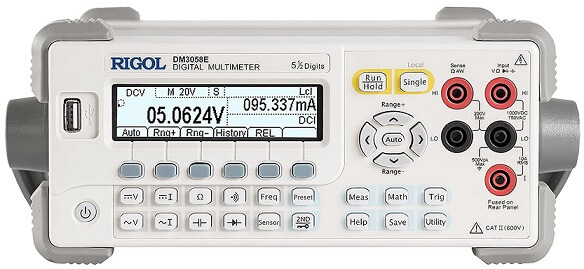
The Rigol DM3058E Digital Multimeter is yet another premium and high precision instrument designed to cater to the diverse needs of professionals. The DM3058E offers 5½ digits readings resolution like most premium choices offering highly detailed and accurate measurement results. And with a measurement speed of up to 123 readings per second, this multimeter ensures rapid results. It allows you to efficiently perform tasks that require quick measurements without compromising accuracy.
The multimeter is also equipped with true RMS AC voltage and AC current measuring capabilities, ensuring accurate readings for both AC signals, making it a reliable tool for a wide range of electrical measurements. It also simplifies your work by allowing you to save and recall up to 10 preset configurations quickly. This feature streamlines repetitive tasks, enhancing your productivity. For added flexibility, the multimeter is compatible with the UltraSensor measurement control software. This software allows users to easily control and gather data from various sensors.
Best Features
- This is a 5½ digit resolution bench multi meter
- 200 mV – 1000 V DC voltage measurement range
- 200 mV -750 V AC voltage measurement range
- The current measurement range is 200 µA -10 A
Pros
- Capable of saving up to 10 groups os preset configurations
- It supports remote control
- It has a built-in help system for ease of use
Cons
- Very expensive for hobbyists and beginners
Buying Guide For The Best Bench Multi Meter
Choosing an ideal bench multimeter is crucial for several reasons. First and foremost, it ensures the accuracy and reliability of measurements. Bench multimeters are often used where precise measurements are essential. An inaccurate or unreliable multimeter can lead to incorrect data, which can have serious consequences, particularly in industries like electronics, telecommunications, and automotive, where precision is paramount.
Additionally, selecting the right bench multimeter can enhance productivity of the process. These instruments often come with advanced features such as data logging, data storage, and computer interface options, which can streamline the measurement process and enable efficient data analysis. However, choosing the ideal bench multimeter can be challenging due to the wide variety of models available in the market. In order to make an informed decision, you need to know the important characteristics and specifications of the instrument and their impact on the device’s capabilities.
1. Resolution
Unlike physical measurement instruments, it is slightly difficult to get an idea about the least count for an instrument which is used to measure electrical parameters such as voltage and current. For that, the manufacturers mention the resolution of the device, which is basically the littlest increment identifiable by the bench multi meter. In other words, it represents the level of detail or granularity in the measurement results. A higher resolution multi meter offers measurement results with greater precision.
This precision is particularly crucial in scientific and engineering applications where even small variations in electrical parameters can have significant implications. For example, when working with sensitive electronic circuits or conducting research experiments, a multimeter with high resolution can reveal subtle changes in voltage, current, or resistance. The resolution of this instrument also plays a role in determining the calibration uncertainty, which is the range within which a measurement is considered accurate. A higher resolution option can help reduce this uncertainty and contribute to more reliable calibration results.
2. Voltage Measurement Range
The Voltage measurement range, on the other hand, defines the highest and lowest limit of voltage within which the device can be used. While you can still use the bench multi meter for circuits which have a voltage outside this range, the results from the device for the same will not be accurate. One of the primary reasons why voltage measurement range is important, apart from compatibility, is safety.
Electrical systems can operate at different voltage levels, ranging from millivolts to kilovolts or even higher with high power circuits. In such a case, attempting to measure a voltage higher than the multimeter’s range can overload the instrument, potentially causing it to fail or posing an electrical hazard to the user. On the other hand, if the multimeter’s range is too high for the voltage being measured, it may lack the sensitivity needed to capture small variations or perform accurate measurements. Therefore, choosing the right voltage range ensures that the instrument can provide precise readings within that specified range.
3. Current Measurement Range
Just like the voltage measurement range, the current measurement range of a bench multi meter is a similarly important factor which you should not overlook while buying one. Similar to the voltage range, the accuracy and precision are highly affected by the current measurement range of the device. An appropriate current range ensures that the multimeter can provide accurate readings within that range. Using a range that is too broad may reduce measurement accuracy, as the instrument may lack the sensitivity needed to capture small variations in the current. Similarly, a narrow range may limit the versatility of the multimeter and its ability to measure current in a high-power circuit. Furthermore, the current measurement range can also impact the multimeter’s resolution, which is the smallest increment it can display or measure. A narrow current range may allow for higher resolution, making it possible to detect fine details and small fluctuations in current levels. And as the range increases, the resulting resolution can decrease, making it difficult to identify small changes in the experiment.
4. Accuracy
Just like any other instrument, accuracy is one of the factors that matters the most for a bench multi meter. For a multi-meter, accuracy refers to how closely the multimeter’s measurement matches the true or actual value of the electrical parameter being measured. It is a critical factor that impacts various industries and applications where precision and reliability are paramount. This ensures the quality and safety of electrical systems and devices. In applications like electronics manufacturing, automotive engineering, and aerospace where tight tolerances and high standards are essential, even minor measurement errors can lead to significant issues. Inaccuracies in voltage or current measurements can result in faulty components, circuit malfunctions, or even safety hazards. Therefore, an accurate multimeter is indispensable for diagnosing problems, ensuring compliance with standards, and maintaining the integrity of electrical systems.
5. Connectivity
Connectivity refers to the ability of the instrument to interface with other devices, such as computers, smartphones, or data-logging equipment. This feature enhances the functionality and versatility of the multimeter, making it a valuable tool in various industries and applications. One of the primary reasons for the importance of connectivity in a multimeter is data management and analysis. Multimeters with advanced connectivity options can transfer measurement data to external devices, allowing for efficient data storage and analysis. This is especially beneficial in research, quality control, and troubleshooting scenarios where large amounts of data need to be collected, recorded, and processed. By connecting the multimeter to a data logger, you can easily store and analyze data, generate reports, and track changes over time, streamlining the workflow and improving overall productivity.
Bench Multimeter – FAQs
Ans: A bench multimeter is a complex electronic test instrument designed to measure various electrical parameters accurately and with high precision. It has multiple input terminals, including ports for connecting test leads or probes. These input connections allow the user to connect the multimeter to the electrical circuit or device they want to measure. The core of the multi meter’s measurement process is the ADC, which converts the analog electrical signal from the input into a digital value that the multimeter’s microprocessor can process. The resolution of the ADC determines the level of detail in the measurement.
Ans: Yes, there are some affordable alternatives to bench multimeters that cater to different budget constraints and specific measurement needs. While high-end bench multimeters offer advanced features and high levels of precision, there are other options available that provide basic measurement capabilities at a lower cost. Some common examples for the same would be handheld multi meters, digital clamp meters, etc. You can also find some highly advanced tools such as bluetooth multi meters which can directly send the test results to your smartphone, using it as a large high-resolution display for your multi meter setup.
Ans: The accuracy of a benchtop multimeter can vary widely depending on several factors, including the quality of the instrument, its specifications, and its calibration. Generally, benchtop multimeters are known for their high accuracy and precision, making them suitable for demanding measurement applications. The accuracy of a benchtop multimeter also depends on the manufacturer and specific model. Reputable manufacturers that specialize in test and measurement equipment tend to produce multimeters with higher accuracy and reliability.
Ans: Bench multimeters and handheld multimeters are two distinct types of measurement instruments designed for different types of applications. Where bench multimeters are larger, heavier and designed to be stationary instruments placed on a workbench or laboratory table, handheld multimeters are much more compact and portable, intended to be carried in a toolbox. This size and portability make the handheld multimeters more versatile in fieldwork.
Bench multimeters typically offer a wider range of measurement functions and capabilities. They can measure a broader spectrum of parameters, including voltage, current, resistance, capacitance, frequency, temperature, and more. Handheld multimeters, on the other hand, are often designed for essential electrical measurements, such as voltage, current, resistance, and continuity.
Conclusion
Choosing the ideal bench multimeter is crucial for accurate and reliable measurements in various industries and applications. But due to the wide range of options available, it can be challenging to make the right choice. Therefore, it’s essential to refer to the specifications and characteristics mentioned above to ensure that the selected multimeter aligns with your specific measurement requirements, safety standards, and budget constraints.
To help you make an informed decision, we have brought you our top picks for the best bench multi meter. These options will not only improve the quality of your measurements but also enhance your overall productivity and efficiency. And if you are not fully aware about the core properties of a bench multi meter or how you can pick up the right option based on your needs, you can also check out our buying guide for the best bench multi meter and make a decision based on that. We also have the top recommendations lined up for you right here which might be the perfect option for your measurements.
- For those of you who are looking for an affordable bench multi meter, we suggest going with the Abestop Bench Multi Meter. This is a handy and compact option for a bench multi meter which comes with a 3.5 inches LCD display and offers resolution of 55000 counts. It also has a voltage measurement range of 50 mV to 1000 V for AC circuits and 500 mV to 750 V for DC. On top of everything, this highly affordable bench multi meter comes with a year of quality assurance which you will surely appreciate.
- On the other hand, for professional applications, there aren’t a lot of options available which can be as precise and accurate as the Siglent SDM3055 Bench Multi Meter. This is a 5.5-digit digital bench multi meter which is capable of true RMS results for utmost precision. The measurement speed of the device ranges up to 150 rdgs/s which is pretty good and suitable for professional work. It also has a 1 Gb Nand flash storage where you can store the configuration files and data of the measurements.
- The Siglent Bench Multi Meter is also a highly premium and reliable digital bench multi meter which can be the best option for professional applications. It also supports dual display along with true RMS so the basic DC accuracy range is around 0.1 percent at all times. It also comes with a built-in cold junction that allows TC temperature measurements without any problem. As for connectivity, you can use the USB hose available on the device as well as the LAN port to directly connect the device to your laptop or computer.

